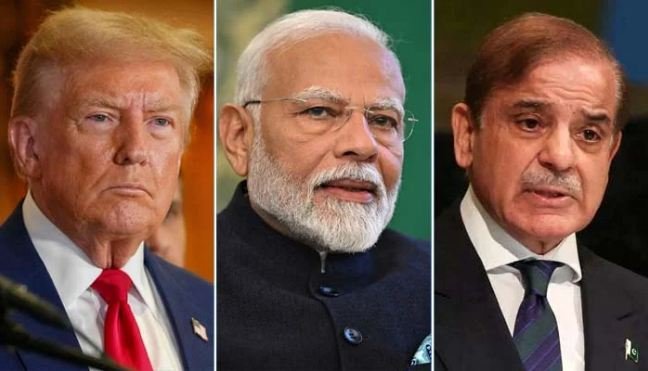Trump’s renewed tilt toward Pakistan raises urgent questions: Is the U.S. abandoning India’s democratic hopes in favour of strategic ambiguity and realpolitik?
A Historical Contradiction
For decades, the United States treated India—and by extension New Delhi’s democratic ethos—as a partner in global normative order. The pivot to India was a moral as well as strategic statement. Yet today, a paradox looms large: Washington’s surprising warmth toward its old adversary, Pakistan.
Imagine the chessboard of South Asia: the knight has made a dramatic turn. Once Delhi’s moral ally, America now speaks in corridors with Islamabad. A contradiction? Yes. And it’s deliberate. This shift demands urgent scrutiny—not just of policy, but of values.
Background & Context
U.S.–India Rapprochement under Previous Administrations
Under Presidents Obama and Trump (in his early years), the U.S.–India relationship flourished. Strategic dialogue was institutionalized, New Delhi welcomed into the Quadrilateral Security Dialogue, and the Abraham Accords hinted at a broader coalition against rising authoritarian drift. India was being woven into America’s geopolitical choreography—embraced as a democratic middle‑power hedge against authoritarianism.
Pakistan’s Strategic Value: From Cold War to Counterterrorism
Yet Pakistan remained vital. From the Cold War to the post‑9/11 era, Islamabad was the proxy muscle: a site of geopolitical leverage, a bulwark—or a nuisance. Even authoritarian populism in Pakistan served U.S. realpolitik when it counted. The moral and strategic calculus often diverged.
Authoritarian Populism in South Asia
Both India and Pakistan have seen populist leadership. But there’s a moral contrast: India’s democratic populism still retains institutional pluralism; Pakistan’s has often been intertwined with military dominance and strategic ambiguity. Islamabad’s “comfort” with U.S. policymakers often came when transactional benefit outweighed normative concerns.
Muscular Diplomacy vs. Normative Order
Today’s tilt toward Pakistan reflects muscular diplomacy—hard‑line leverage over the region—rather than normative diplomacy based on democratic values. It’s a choreography that sacrifices moral consistency for tactical gain: immediate access, intelligence cooperation, and regional leverage vis‑à‑vis China and Afghanistan.
Strategic Ambiguity in Washington’s Choreography
Strategic ambiguity becomes central: is the U.S. re‑embracing Pakistan entirely, or keeping India at arm’s length? The dual messaging is striking. On paper, India is the democratic linchpin; in practice, Islamabad is the quick‑access lever. That tension undermines predictive clarity—both for New Delhi and for democratic order.
Democracy Underdog India vs. Autocratic Pakistan
It is starkly ironic: India, with its vibrant civil society, free press, competitive elections, is being overshadowed in U.S. engagement by Pakistan—where the democratic experiment is fragile, and power often rests with the military, not the ballot box. This inversion is not just strategic—it’s a striking moral dissonance.
U.S. Championing Multilateralism While Cosying with Authoritarian Regimes
While Washington preaches multilateralism and normative order, the diplomatic embrace of Pakistan reveals the contradiction: ideological flexibility when it suits interests. The U.S. looks to contest China’s Belt and Road in South Asia, yet relies on a regime with limited democratic credentials. Tough talk. Soft sincerity.
Regional and Global Power Dynamics
U.S.–China Rivalry: India’s Rising Middle‑Power Agency
India is the prototypical democratic middle power—strategically located, economically rising, and ideologically aligned with Western norms. Yet the dramatic pivot toward Pakistan weakens New Delhi’s role in the U.S.’s emerging coalition. The message is: reliability trumps democratic legitimacy.
ASEAN, BRICS and Alternative Poles
At the same time, India is deepening its forward role in BRICS, sponsoring an independent trajectory. ASEAN nations watch warily. If the U.S. can pivot unpredictably, regional actors ramp up their own multipolar hedging. The normative order frays; multipolarity emerges.
Realpolitik vs. Normative Diplomacy
This shift is textbook realpolitik. Democratic values become secondary to tactical gain. Strategic calculus replaces moral coherence. And when realpolitik prevails, disorder may follow. Democratic agency becomes expendable.
Multipolarity and India’s Strategic Hedging
In response, India hedges: deeper ties with Russia, strong South Asia outreach, coastlines—and strategic patience. Sovereignty becomes not only national defense, but a protest against democratic betrayal. It’s a normative shield.
Democracy as Strategic Asset, Not Charity
Democracy isn’t charity. It’s a strategic asset. When Delhi counts for less than Islamabad in Washington’s ledger, moral bankruptcy shadows the global order. One cannot preach the normative order while grooming transactional alliances with authoritarian structures.
Sovereignty and Geopolitical Justice in South Asia
For India and other Global South nations, sovereignty is more than non‑interference—it’s respect for democratic evolution. If diplomatic shifts ignore that, geopolitical justice unravels.
Conclusion: A Warning from the Chessboard
The pivot to Pakistan signifies more than policy change. It signals a sacrifice of democratic values for strategic immediacy. India, once the democratic linchpin in Washington’s regional playbook, risks being marginalized.
If America abandons democratic principles for convenience, it shrinks the terrain of global normative leadership. The framework of global South agency—anchored in democracy and sovereignty—may unravel. The strategic choreography becomes chaotic. And the moral order loses integrity.
Warning: Democracies cannot remain assets to be deployed—or sidelined—at will. If Washington continues to devalue democratic India for transactional advantages with authoritarian Pakistan, it emboldens global disorder. The message to New Delhi—and to all democratic middle powers—is clear: sovereignty and democratic justice demand consistency, not calculus.

